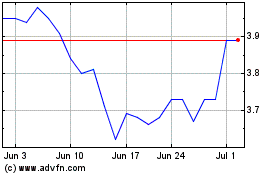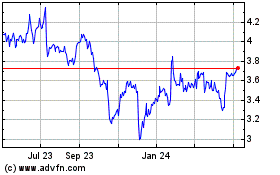China Warns Tech Companies About Complying With Trade Restrictions -- Update
June 08 2019 - 7:11PM
Dow Jones News
By Asa Fitch and Yoko Kubota
Chinese authorities summoned some of the world's largest tech
companies this week to tell them they could face repercussions if
they respond too aggressively to U.S. trade restrictions, according
to people familiar with the matter.
Called by China's National Development and Reform Commission on
Tuesday and Wednesday, the meetings with more than a dozen
companies add a new dimension to Beijing's pushback against the
Trump administration's restrictions on access to advanced American
technology amid a lengthy trade dispute.
Among the companies called in were chip makers Intel Corp.,
Qualcomm Inc., ARM Holdings PLC and SK Hynix Inc., software giant
Microsoft Corp., South Korea's Samsung Electronics Co., computer
maker Dell Technologies Inc., Finnish electronics company Nokia
Corp. and networking equipment maker Cisco Systems Inc., according
to one of the people.
Intel and ARM declined to comment. The other companies didn't
immediately respond to requests for comment.
The warnings, previously reported by the New York Times,
followed several rounds of new tariffs imposed by the Trump
administration on billions of dollars of goods flowing from China
to the U.S. As trade talks faltered last month, the administration
upped the ante by putting Huawei Technologies Co. on a trade
blacklist, further chilling already cold ties between the world's
two biggest superpowers.
The move against Huawei disallowed sales to the telecom giant
without a Commerce Department license. China responded by
announcing an "unreliable entity list" for foreign companies that
stopped supplies to China or took other actions seen as damaging
the interests of Chinese companies.
On Saturday, Chinese official news agency Xinhua reported the
NDRC, China's central economic planning body, was studying the
establishment of yet another list system to "more effectively
forestall and defuse national security risks." Xinhua also said in
a commentary that this new system would prevent "certain countries
from using Chinese technologies and simultaneously curbing China's
development."
In the meetings this week, Chinese officials told foreign tech
companies that there would be unspecified consequences if they
pulled out of China, ended business partnerships there or stopped
supplying products to Chinese customers, especially if those moves
were in line with mandates by countries China saw as breakers of
international rules, one person familiar with the matter said.
Another person familiar with the meetings said the Chinese
understood that multinational companies had to comply with U.S.
law, but that their message was that the firms shouldn't pare back
their exposure to China any more than they were required to.
The person described the meetings between midlevel China-based
company executives and midlevel NDRC bureaucrats as cordial but
unusual. In addition to delivering the warning, Chinese officials
asked what the companies' barriers were to doing business and how
the Chinese government could help, the person said.
Companies with U.S. operations must comply with the
administration's restrictions on their dealings with China. They
can, however, seek licenses from the Commerce Department that allow
them to continue trading with Huawei or any other entity that faces
similar restrictions in the future.
China's targeting of American technology has been central to the
Trump administration's trade concerns. The same day Huawei was
blacklisted last month, Mr. Trump issued an executive order banning
foreign technology dealings when they raised national security
concerns, citing "malicious cyber-enabled actions, including
economic and industrial espionage."
Negotiations with China appeared to be progressing toward a
trade deal before last month, when the administration accused China
of reneging on commitments by seeking significant changes to an
agreed-upon deal. That set off another round of punishments and
reprisals by both sides, with the U.S. raising tariffs on $200
billion of Chinese goods and China slapping new tariffs on $60
billion of U.S. goods.
China's NDRC couldn't be reached by telephone late Saturday.
Write to Asa Fitch at asa.fitch@wsj.com and Yoko Kubota at
yoko.kubota@wsj.com
(END) Dow Jones Newswires
June 08, 2019 18:56 ET (22:56 GMT)
Copyright (c) 2019 Dow Jones & Company, Inc.
Nokia (NYSE:NOK)
Historical Stock Chart
From Mar 2024 to Apr 2024

Nokia (NYSE:NOK)
Historical Stock Chart
From Apr 2023 to Apr 2024
